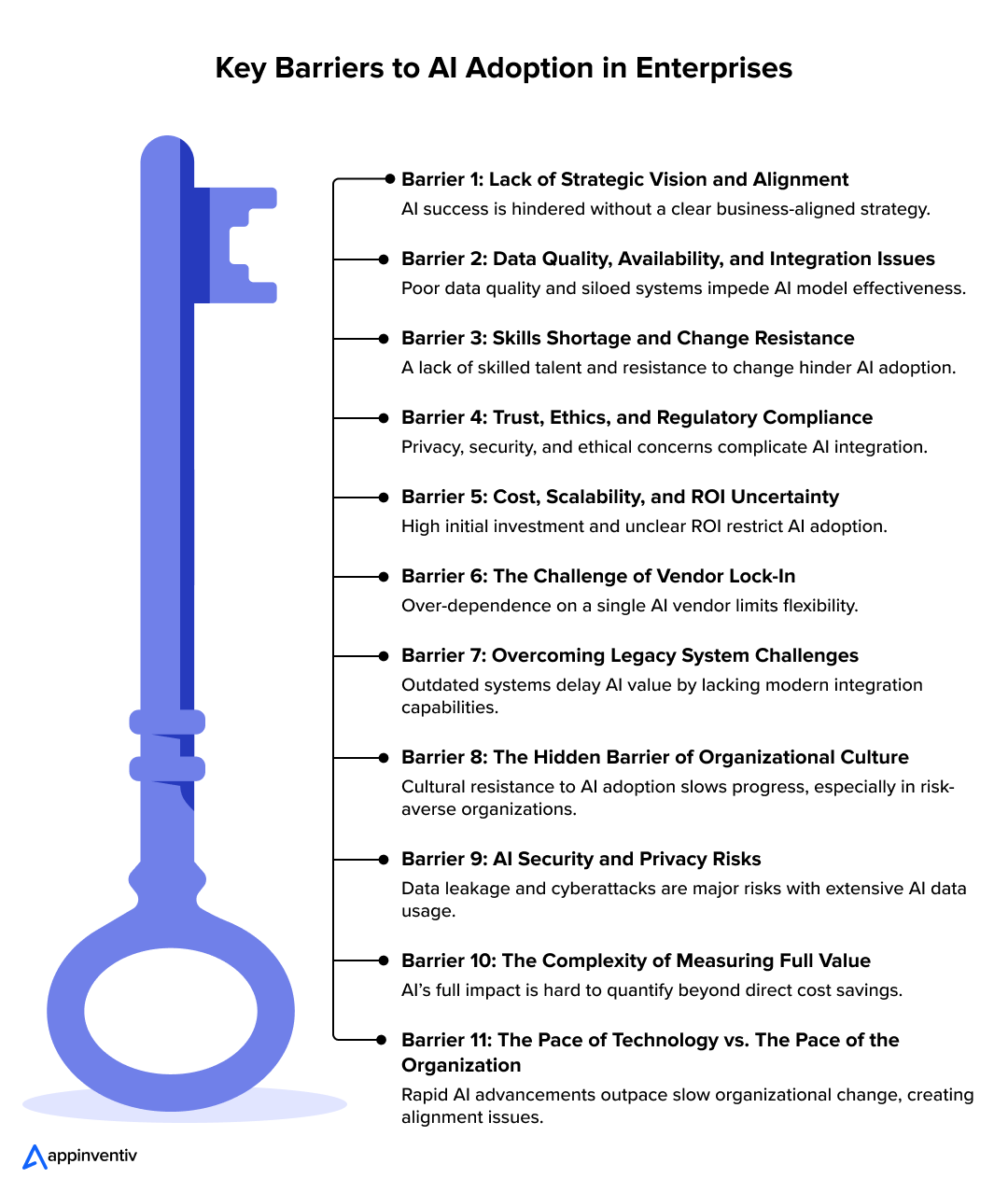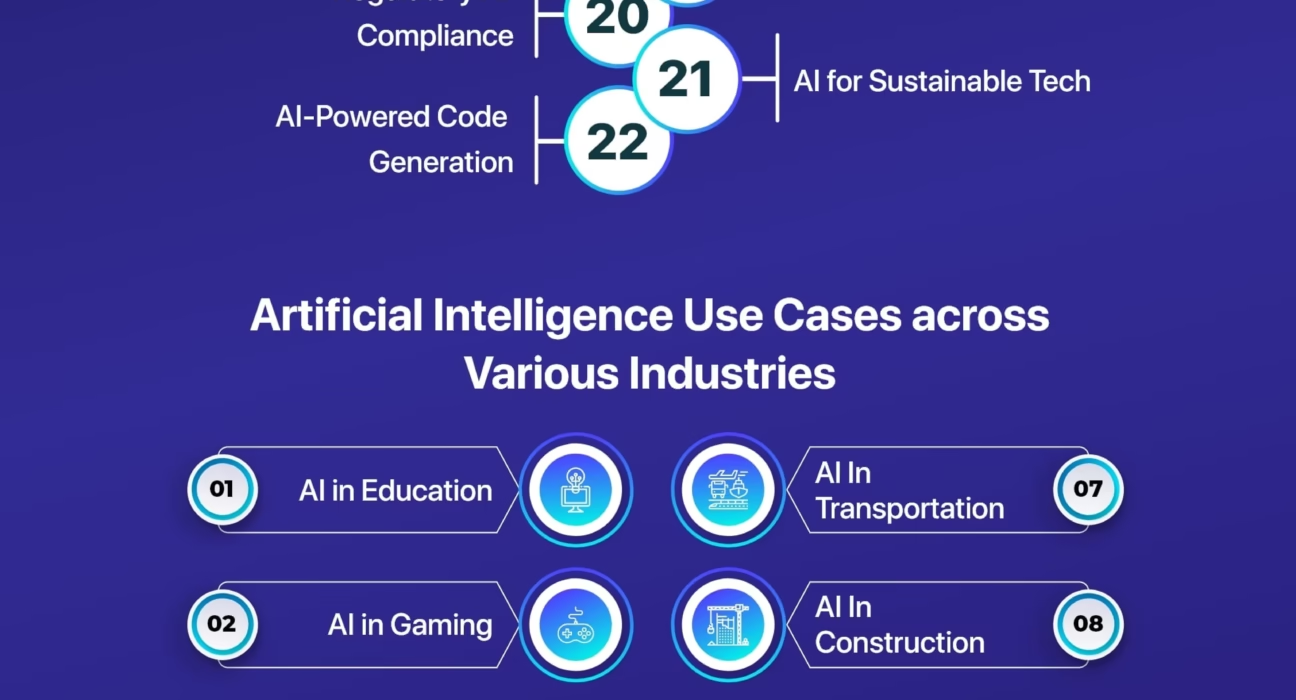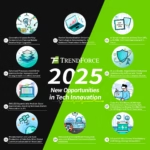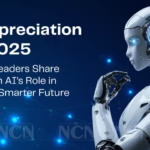Enterprise AI Adoption Trends 2025: Navigating the Future of Business
Estimated reading time: 15 minutes
Key Takeaways
- Artificial Intelligence (AI) has evolved from an experimental technology to a critical business imperative, with **78% of organizations globally now using AI in at least one business function** as of 2025.
- The focus has shifted from *if* to *how* to scale and integrate AI effectively, with companies looking to optimize and expand their AI implementations.
- Generative AI adoption has surged dramatically, reaching **71% in 2025**, transforming content creation, customer service, and R&D.
- AI-powered automation of complex tasks is on the rise, with **79% of companies using agentic AI** and reporting productivity gains.
- Key challenges include data quality, talent gaps, integration with legacy systems, organizational change, and ethical considerations.
- AI significantly impacts innovation by accelerating R&D, uncovering new market opportunities, enabling hyper-personalization, and driving disruptive business models.
- Strategies for accelerating adoption involve clear vision, starting small, investing in talent, fostering collaboration, strong data governance, and building an AI-ready culture.
Table of Contents
- Enterprise AI Adoption Trends 2025: Navigating the Future of Business
- Key Takeaways
- The Current Landscape of Enterprise AI Adoption
- Key Enterprise AI Adoption Trends for 2025
- The Role of Generative AI in Business Strategy
- Navigating AI Implementation Challenges
- The AI Impact on Innovation
- Strategies for Accelerating AI Adoption in Companies
- Frequently Asked Questions
The Current Landscape of Enterprise AI Adoption
The landscape of enterprise AI adoption has transformed dramatically. What was once a niche technology is now a fundamental driver of business success. A staggering **78% of organizations globally** are now utilizing AI in at least one business function as of 2025, a significant leap from previous years. This widespread adoption is not just about experimenting with AI; it’s about integrating it into core operations and realizing tangible benefits.
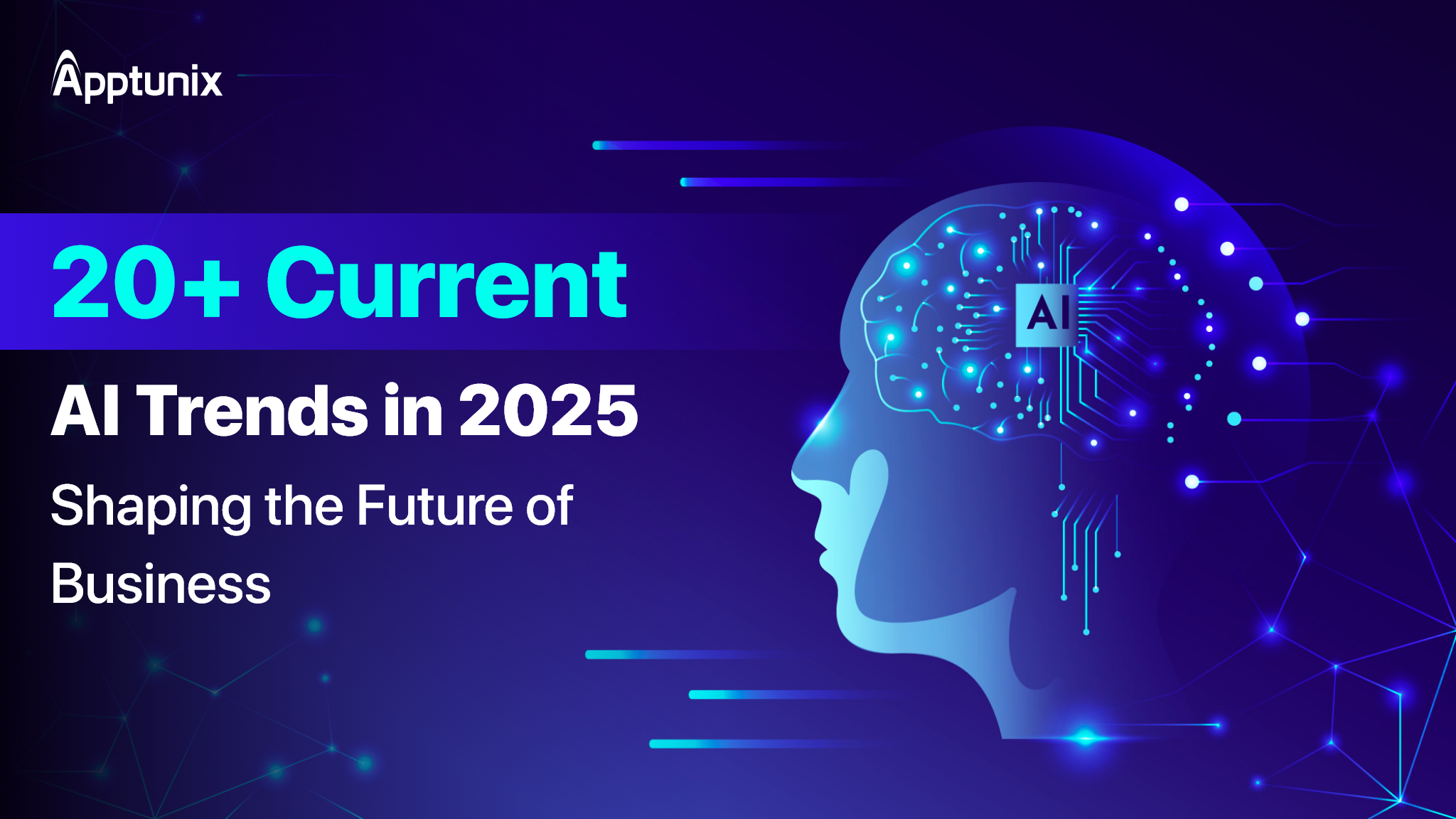
One of the most striking shifts is in the adoption of generative AI. This powerful subset of AI has seen remarkable growth, surging from 33% in 2023 to an impressive **71% in 2025**. This indicates a rapid embrace of AI’s creative and generative capabilities across various industries.
Companies are no longer confining AI to isolated projects. The average organization is now implementing AI across **three different business functions**, demonstrating a more strategic and integrated approach to AI deployment. This expansion signifies a growing understanding of AI’s versatility and its potential to optimize diverse operational areas.

Let’s look at AI adoption in key industries:
- Healthcare: This sector boasts a **36.8% CAGR**, driven by AI’s applications in diagnostics, patient management, and the increasing use of AI-powered chatbots by **42% of healthcare networks**.
- Manufacturing: Adoption rates have reached **77%** (up from 70% in 2024). The focus here is on predictive maintenance, supply chain optimization, and process automation.
- IT & Cloud: This sector continues to lead in AI investment, particularly in cloud-based AI platforms and the rapid growth of AI-as-a-Service (AIaaS) models.
These figures highlight significant **enterprise AI adoption trends 2025**. Healthcare and manufacturing, in particular, are showing the fastest growth due to the clear demonstration of AI’s return on investment (ROI) and its ability to solve complex, real-world problems. Furthermore, U.S. organizations continue to lead global AI investment, with private AI funding reaching a substantial **$109.1 billion in 2024**.

Key Enterprise AI Adoption Trends for 2025
As we navigate 2025, several key **enterprise AI adoption trends** are shaping the business landscape:
- Generative AI Goes Mainstream: The meteoric rise of generative AI is undeniable. As previously noted, its usage has jumped from 33% to **71% in just two years**. This trend is impacting everything from content creation and marketing personalization to accelerating research and development, fundamentally altering how businesses create and innovate.
- AI-Powered Automation of Complex Tasks: The era of AI agents is here. A significant **79% of companies are already using agentic AI**, with two-thirds reporting notable productivity gains. The next frontier is the development and implementation of multi-agent systems, designed to coordinate complex processes and achieve sophisticated outcomes.
- Focus on AI Ethics and Responsible AI: With AI becoming more pervasive, concerns surrounding bias, transparency, and ethical usage are moving to the forefront of corporate strategies. Businesses are increasingly prioritizing the development and deployment of AI systems that are fair, accountable, and aligned with societal values.
- Growth in AI-as-a-Service (AIaaS): Cloud-based AI platforms are emerging as the fastest-growing technology segment. Industries like insurance and healthcare are accelerating their investments in AIaaS, leveraging scalable, on-demand AI solutions to meet diverse business needs.
- Data-Centric AI Strategies: The focus on data is intensifying. Projections suggest that by 2030, synthetic data used for model training will surpass real-world data. This signals a strategic shift towards prioritizing data quality, robust data governance, and innovative data generation techniques to fuel AI development.

The Role of Generative AI in Business Strategy
Generative AI is no longer just a buzzword; it’s a pivotal component of modern business strategy. Its ability to create new content, designs, and insights is revolutionizing product development, enabling hyper-personalized marketing campaigns, automating and enhancing customer service interactions, and optimizing intricate operational processes. The tangible business value is immense, with companies reporting a remarkable **3.7x ROI for every dollar invested in generative AI**.

Consider these concrete examples:
- In healthcare, AI-powered chatbots are efficiently handling patient inquiries, freeing up medical staff for more critical tasks.
- Manufacturing firms are leveraging generative design to create lighter, stronger, and more efficient components.
- Marketing departments are using advanced content creation tools to produce personalized and engaging customer communications at scale.
These applications underscore generative AI’s transformative power, making it an indispensable tool for competitive advantage and future growth.
Navigating AI Implementation Challenges
Despite the immense potential of AI, enterprises often encounter significant **AI implementation challenges**. Addressing these hurdles proactively is crucial for successful and sustainable AI adoption.
- Data Quality and Availability: AI models are only as good as the data they are trained on. Poor data quality directly hinders AI effectiveness, leading to inaccurate predictions and flawed insights. This reality is driving increased demand for synthetic data generation and robust data governance practices to ensure data integrity.
- Talent Gaps and Upskilling: The shortage of skilled AI professionals remains a persistent challenge. Organizations must invest in continuous training and reskilling initiatives for their existing workforce, alongside strategic hiring, to build the necessary AI expertise in-house.
- Integration with Legacy Systems: Integrating cutting-edge AI technologies with existing IT infrastructure can be a complex and time-consuming process. It requires meticulous planning, significant investment, and often a phased approach to ensure seamless compatibility and avoid disruption.
- Organizational Change Management: Cultural resistance to new technologies and a lack of strong leadership buy-in can significantly impede AI initiatives. Effective change management strategies are essential to foster understanding, adoption, and collaboration across all levels of the organization.
- Ethical and Security Concerns: As AI becomes more integrated into business operations, concerns surrounding ethical AI use, mitigating bias, and ensuring data privacy and security are paramount. Enterprises must develop clear ethical guidelines and robust security protocols to build trust and protect sensitive information.
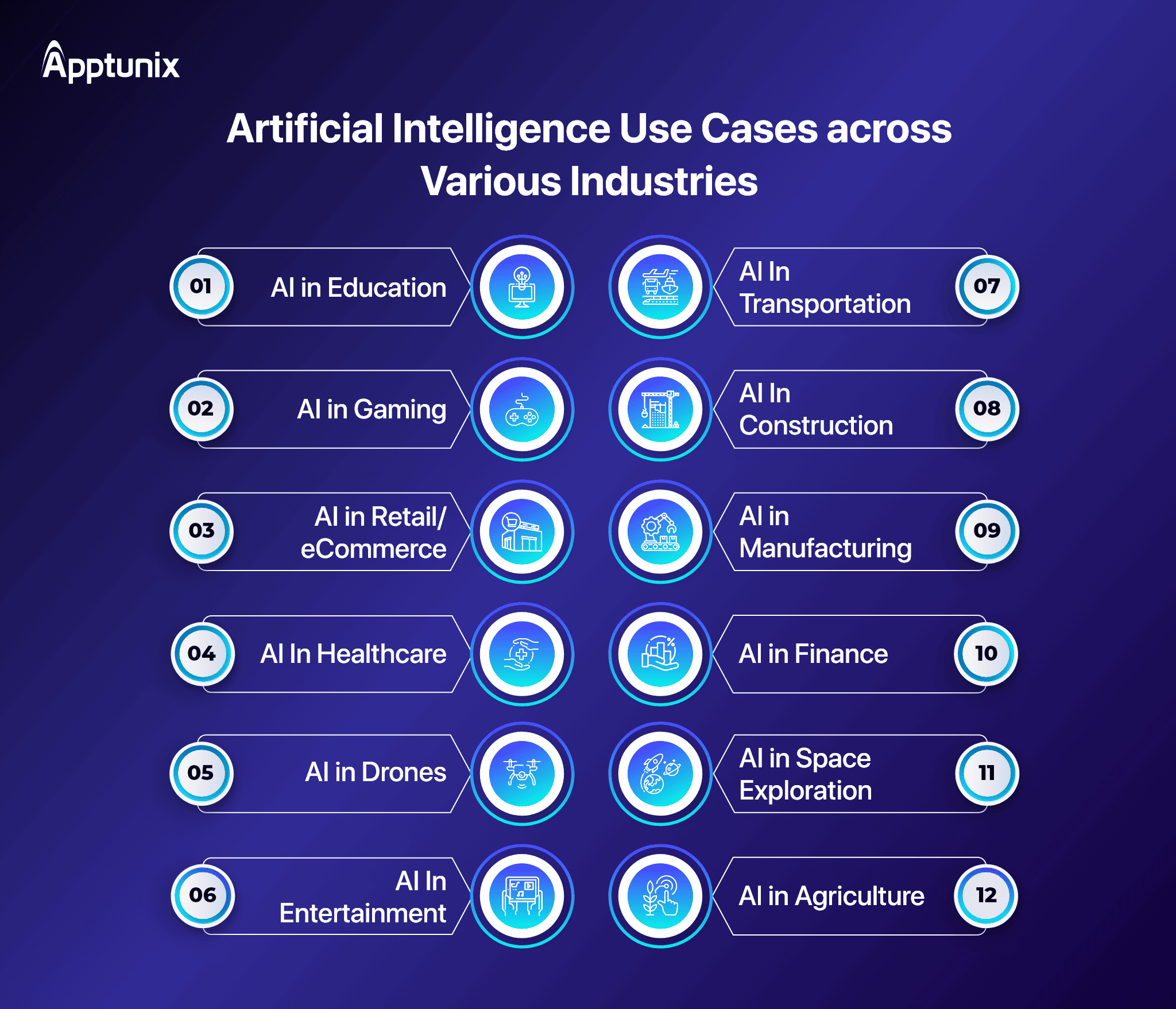
The AI Impact on Innovation
Artificial Intelligence is a powerful catalyst for business advancement, fundamentally reshaping how companies innovate and grow. The **AI impact on innovation** is multifaceted and profound:
- Accelerate R&D Cycles: AI-driven simulations and advanced data analysis capabilities enable businesses to dramatically shorten discovery phases. This leads to faster identification of promising research avenues and a significantly reduced time-to-market for new products and services.
- Uncover New Market Opportunities: By analyzing vast datasets, AI can identify subtle patterns, unmet customer needs, and emerging market trends that might otherwise go unnoticed. This empowers businesses to proactively develop offerings that resonate with evolving consumer demands.
- Enable Hyper-Personalization: AI allows for the creation of highly tailored products, services, and customer experiences at an unprecedented scale. This level of personalization enhances customer engagement, loyalty, and satisfaction.
- Drive Disruptive Business Models: AI is not just improving existing processes; it’s enabling entirely new business models. From AI-powered platforms that connect disparate services to the development of fully autonomous operations, AI is fundamentally redefining industries and creating new market leaders.
- Foster Continuous Improvement: AI facilitates agile and iterative development by providing real-time feedback loops and predictive analytics. This allows businesses to constantly refine their offerings, optimize performance, and stay ahead of the competition.

Strategies for Accelerating AI Adoption in Companies
To truly harness the power of AI, organizations need strategic approaches to accelerate its adoption. Here are key actionable strategies:
- Develop a Clear AI Vision and Roadmap: Align AI initiatives with overarching business objectives. Secure strong executive sponsorship and clearly articulate the value proposition of AI to all stakeholders. This ensures that AI efforts are focused and supported.
- Start Small, Scale Success: Begin with well-defined pilot projects that can demonstrate tangible value and quick wins. Once successful, these initiatives can serve as blueprints for broader, organization-wide AI implementation, reducing risk and building confidence.
- Invest in Talent and Training: Building in-house AI expertise is critical. This involves strategic hiring of AI specialists, implementing comprehensive upskilling and reskilling programs for existing employees, and potentially forming beneficial partnerships with external AI experts or institutions.
- Foster Cross-Functional Collaboration: Break down departmental silos. Encourage collaboration between IT, data science, business units, and operations to ensure AI solutions are integrated effectively and meet diverse needs across the organization.
- Establish Strong Data Governance: Reliable AI outcomes depend on high-quality, secure, and compliant data. Implement robust data governance frameworks that ensure data accuracy, integrity, accessibility, and privacy.
- Build an AI-Ready Culture: Cultivate a workplace environment that embraces experimentation, continuous learning, and adaptability. Encourage employees at all levels to explore AI possibilities and foster a mindset that views AI as an enabler of progress.

Frequently Asked Questions
What are the most significant enterprise AI adoption trends for 2025?
The key trends include the mainstream adoption of generative AI, the rise of AI-powered automation through AI agents, a growing emphasis on AI ethics and responsible AI practices, the expansion of AI-as-a-Service (AIaaS), and a strategic shift towards data-centric AI approaches.
How is generative AI impacting business strategy?
Generative AI is revolutionizing business strategy by enhancing product development, enabling hyper-personalized marketing, automating customer service, and optimizing operations. Companies are seeing substantial ROI from generative AI investments.
What are the primary challenges enterprises face when implementing AI?
Common challenges include ensuring data quality and availability, addressing talent gaps and the need for upskilling, integrating AI with legacy systems, managing organizational change and cultural resistance, and navigating ethical and security concerns.
How does AI contribute to innovation within organizations?
AI acts as a catalyst for innovation by accelerating R&D cycles, uncovering new market opportunities, enabling hyper-personalization at scale, driving disruptive business models, and fostering a culture of continuous improvement through data-driven insights.
What strategies can companies employ to accelerate their AI adoption?
Effective strategies include developing a clear AI vision and roadmap, starting with small, scalable pilot projects, investing in talent and training, fostering cross-functional collaboration, establishing strong data governance, and cultivating an AI-ready organizational culture.
